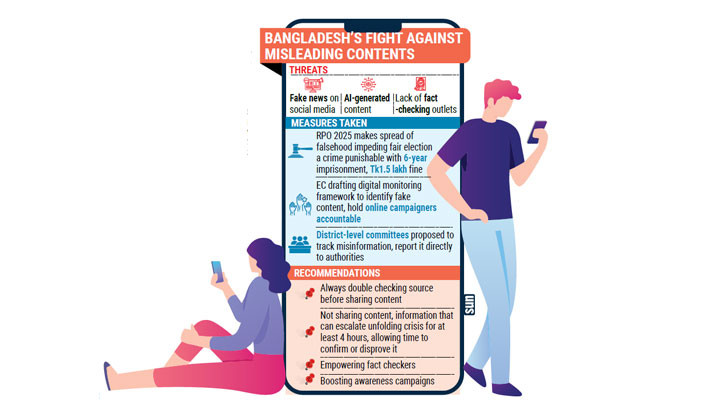THE BATTLE FOR TRUTH
How misinformation threatens next election
SM Mostafijur Rahman, Dhaka
Published: 15 Nov 2025

As Bangladesh approaches its next national election, the contest is not only being fought through rallies and on ballots — it is unfolding across screens, feeds, and chat groups, frequently attacked by misinformation campaigns.
To overcome the hurdles posed by false propaganda centred on the next election, the authorities concerned have introduced different measures, but experts call for stricter measures to nullify the threat as the country enters one of its most dangerous digital moments yet, where AI-generated content threatens to distort public perception and undermine democracy.
Recently, media outlets reported that a political party in the country posted a photo on its official social media handle, which was widely shared by its followers, but subsequently, through various fact-checking processes, it was proven to be a fake image.
Similar confusing contents mixing truth with falsehood proliferate on Facebook, Twitter and YouTube.
Acknowledging this challenge, Bangladesh has incorporated stringent measures into the Representation of the People (Amendment) Ordinance (RPO) 2025 to restrict the circulation of deceptive or inaccurate content throughout the electoral period.
Article 73A of the RPO, states that, "Whoever, during the period from the publication of notification under Article 11 to the date of publication of the result of the election in the official gazette knowingly creates, publishes, shares, or promotes any false or misleading information, image, video, audio, or other content—whether created manually or generated by artificial intelligence (AI) tools—with intent to harm the reputation of any contesting candidate or to influence the election result or otherwise impair the electoral integrity and environment, or uses automated bots, fake accounts, or synthetic media to disseminate false information against opposition candidates, political parties or the Commission, shall be guilty of corrupt practice under Article 73 and shall be punished thereunder."
The updated RPO also classifies the deliberate creation or spread of false information during elections as a violation of the election code of conduct, punishable by up to six years in prison and a fine of Tk1.5 lakh.
Strict fact-checking measures demanded
Researchers from local fact-checking initiatives have expressed concern over the proliferation of election-related misinformation, particularly on Facebook, TikTok, YouTube, and messaging apps — platforms where false narratives can spread faster than corrections can catch up.
Ariful Islam Arman, Head of New Media Initiative at Dhakapost, said to avoid this, fact-checking, strict monitoring of digital platforms, and public awareness are essential. Additionally, responsible behaviour from political parties and the media can play a crucial role in preventing such misinformation.
Minhaj Aman, research lead at Activate Rights, said, “Today, it’s not only traditional disinformation actors, political campaigners themselves are openly using AI tools to shape narratives, making manipulation easier, faster and within everyone’s reach.
“AI-generated content also tends to be more polished and believable, which means it can spread at a much larger scale before anyone can verify it. In a country like ours, where media literacy remains relatively low, the impact can be severe.”
Chief Election Commissioner AMM Nasir Uddin said the Election Commission (EC) had sought coordinated and effective recommendations from technical experts to combat the misuse of AI.
“The misuse of AI has now become a global concern. We want to launch a coordinated programme to prevent its misuse in the electoral process,” he said.
"The fact-checking mechanism must work quickly. Therefore, we must take coordinated and effective measures. We don't just want guidelines. We want specific and coordinated recommendations," the CEC added.
Sources said the Election Commission has begun drafting a digital monitoring framework, aimed at identifying fake content and holding online campaigners accountable. Moreover, district-level committees are being proposed to track misinformation and report it directly to national authorities.
Still, implementation remains an uphill battle. Detecting AI-generated disinformation in real time requires advanced technology and trained analysts — resources that are still limited.
Wishing anonymity, a top official of the Election Commission said, “Already we have formed a strong committee in this regard. The team is working relentlessly to tackle the matter seriously.”
Steps for detecting lies on social media
Initially, to determine whether any information, image, or video is accurate, the first thing to check is whether the person sharing it is trustworthy—this could be a
friend, a celebrity, or a reliable news outlet.
Additionally, it's important to know whether the person or organisation sharing the information has seen it firsthand or learned it from someone else. When a movement or protest is happening, or a crisis situation is unfolding, any information shared on social media should be double-checked repeatedly.
If, after checking, it seems that sharing the information could escalate the situation, it is better not to share it at all. However, if it is essential to share the information, it is advisable to wait for some time — maybe one to four hours — before sharing. This waiting period allows enough time for the information to be verified or disproved, giving a clearer picture of whether it’s accurate or just a rumour.
Sudeepto Salam, photojournalist and author, said ahead of the upcoming election, artificial intelligence is being used to spread fake videos, audio clips, and posts to confuse voters. This situation weakens the democratic process and creates a crisis of trust.
He said, “Our biggest weakness is that we have not been able to create enough fact-checkers. However, there are many organisations capable of identifying false information and AI-generated content. If we empower them, the fight against misinformation will become easier. It is still possible to spread fact-checking training. Additionally, by involving those working on AI, we can take steps based on their advice.
“There is no alternative but to filter every piece of information and content using intellect and experience. Furthermore, awareness campaigns from the government are crucial. A campaign can be run using both the media and social media platforms.”
The reporter can be reached at [email protected]

